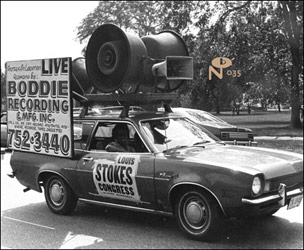
Boddie Recording Company: Cleveland, Ohio
Numero Group
The story of the Boddie Recording Company is like most the Numero Group has uncovered for its Eccentric Soul series. A fascination with electronics eventually led Thomas Boddie to sound recording, and he set up a recording studio in Cleveland in the mid-50s. While he would continue to need to work as an organ and radio repairman on the side to make ends meet, Boddie and his wife, Louise, would put their hearts and souls into the Boddie business, though they never saw much of a return on their investment. Between 1958 and 1993, they issued 300 records and recorded miles of tape, but have been largely forgotten or never even heard of by most.
Run out of a former dairy building behind the home the Boddies purchased at 12202 Union Avenue on Cleveland’s east side, Boddie was a full-service facility, especially after the purchase of record pressing equipment in the late ’60s. As there were few places in Northeast Ohio where one could record a single and get a batch of 45s pressed, the Boddies had a wide variety of acts coming through their doors. They initially had an imprint for each style: Plaid for jazz, Caribi for Latin and Carribean, Bounty for gospel and country, Luau for R&B, and Soul Kitchen for blues. With the operation constantly struggling just to stay afloat though, the couple had little time to seek out acts to record, and their roster ended up favoring the styles of the latter three labels, with plenty of overlap between them.
For this set, available as five LPs or three CDs (we received the latter for review), Numero has really gone the extra mile. Packaged in a cloth binder with file folder–like tabs, the CDs are divided between the Bounty, Luau, and Soul Kitchen labels. Boddie never had even a minor hit (they considered a single a success if it sold out of its 1,000 copies), so it’s doubtful that names like The Chantells or Angela Alexander & JD Saddler will mean anything to you. Still cuts like their “Why Won’t You Say (What You Want)” and “Spoilin’ for a Fight,” respectively, are the kind of gems on which Numero has long made its reputation.
Both of those cuts were released under the Soul Kitchen banner, which between 1967 and 1974 released Boddie’s strongest sides. The imprint housed grimy instrumental funk like The Inter-Circle’s “The Pusher” and groovin’ gospel like “He’s Coming” (a reworking of Sam & Dave’s “Hold On, I’m Comin’”) by The King James Version and everything in between, with all of it revealing the talent in Cleveland to be on par with that in more celebrated locales like Detroit and Memphis.
The Luau imprint seems to have been as loosely defined as Soul Kitchen, with a similarly eclectic mix of R&B, doo-wop and soul bearing its pink label. The label was short-lived, with all 16 sides issued in the mid-60s. Again, the Boddies didn’t seek out talent, so they got what come their way, which was at times as good as any Motown-signed artist or decidedly mediocre. The Bounty disc suffers for this fact the most, as Thomas found many of his clients through his organ-repair calls. The 200-some albums and 45s released with the Bounty name were largely paid for by the acts themselves, so their existence was largely just a matter of economics. (It was common for congregations to pay for such recordings.)
What sets this release apart is the detail and care Numero has paid to the label. Though some of the Bounty cuts had to be taken from records, most of the recordings were pulled from the original master tapes. There are two sets of liner notes, one covering the history of the Boddies and their stable of labels, and the other giving as much information is available for each of the artists included. This second booklet is filled with promo photographs and reproductions of the bands’ calling cards. It is this ephemera that makes this package so special; Numero has also included a reproduction of the Boddie catalog and one of their advertisements. Their claim that it’s like “a self-contained record industry crammed into one box” is accurate. They’ve created an archive of sorts for the label, effectively depicting this cottage industry operation and the fruits of its endeavors. As such, its necessary to tip our hats once again to the Numero masterminds.
Stephen Slaybaugh
PAST PERFECTS
U2, Achtung Baby
Can, Tago Mago
Leonard Cohen, The Complete Albums Collection
The Smiths, Complete
Void, Sessions 1981-83
Fac. Dance: Factory Records 12" Mixes & Rarities 1980-1987
Gregory Isaacs, The Ruler: 1972-1990
The Jimi Hendrix Experience, Winterland
Social Climbers
This May Be My Last Time Singing
Superchunk, Foolish
The George-Edwards Group, Archives
Scrawl, Velvet Hammer
Patti Smith, Outside Society
